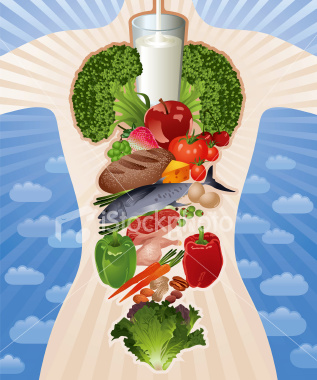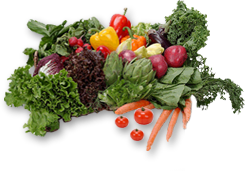


The Foodstate Concept and technology
A natural food, for example a vegetable growing out of the ground, will provide its nutrients to the body in a form that the body can easily recognise, assimilate and absorb. We can consider these nutrients to be in a "food state" form, and instinctively we will understand the benefit of this natural food. The vitamins and minerals within this food will be bound together within a food matrix with a variety of "co-factors" that effectively provide a delivery system for those nutrients to be delivered to receptor sites within the body. Evolution has created this relationship between us and the natural food we eat, yet if you strip away those co-factors you will end up with a nutrient in an isolated form that will never be found in nature. Yet this is the form in which virtually all nutritional supplements exist. We call this form "
Is there a strong argument for taking supplements? If you consider the desperately depleted nutritional value of our farm soils, and if you accept the rationale that a lot of disease processes stem from a nutritional deficiency, then the answer would be a resounding "yes". However, what most people don't appreciate is that nearly all supplements are in a chemical, isolated form, without this delivery system inherent in live food. This is why supplements in a food state form are the preferred form for human consumption. This "
Nature's process is to convert inorganic minerals into an organic mineral form as plants grow in the soil. The plant is then eaten by humans (or animals that humans eat) and the organic mineral thus becomes available for human absorption. With this in mind, "
"
The main reasons are:
1) The vitamins, minerals and trace elements we normally consume come to us as part of the food we eat. This is the best way for us to obtain our vitamins, minerals and trace element requirements.
2) In food, the vitamins, minerals and trace elements are naturally complexed to many different and complex food components.
3) With common supplement tablets, vitamins, minerals and trace elements are in an isolated chemical form, and are not found attached to the many different and complex food components.
4) Foodstate vitamins, minerals and trace elements are naturally complexed to food components, which is similar to the form the body can recognise.
5) Food technology and manufacturing processes alter or even destroy the natural and delicate balance of essential nutrients. Furthermore, modern farm soils are desperately inadequate in their nutritional value. These facts highlight the growing importance of dietary supplementation. Foodstate vitamin, mineral and trace element supplements offer a safer, more bioavailable and effective form.
6) The increased effectiveness of "Food State" products results in: a) More effective distribution within the body b) A general "non-targeting" effect, allowing the body to use nutrients where required in a similar way to food c) Less risk of gastric/gut irritation d) Nutrients are already accompanied by associated food factors that the body needs for their proper utilisation; i.e. there is no need for "Food State" supplements to be taken with food like other supplements.
7) Foodstate vitamin and mineral supplements are used and recommended by leading medical practitioners, as they believe the products outperform other products.
8) The on-going research programme is probably unrivalled for a Food Supplement supplier. A large number of independent studies into the "
9) FoodState products provide prolonged active presence in the body (better than delayed action products).
10) When their superior effectiveness is taken into consideration, Foodstate products are no more expensive per effective dose than other products. What about Yeast Allergies and "
It must be said, however, that no product, is totally non-allergenic. In almost every biochemistry book, we find reference to "Carrier Proteins". These carrier proteins are usually mentioned in relation to their role in transporting atoms of minerals, or molecules of naturally occurring coenzyme form vitamins, through blood plasma, cell membranes, cytoplasma, etc. The term "carrier protein" is used in connection with the metabolic system of animals, but we believe it could be applied to the vegetable kingdom as well. The working substances in an organism are the proteins which we call enzymes. In most cases, enzymes need minerals (called cofactors) and/or vitamins (called coenzymes). These nutrients must be attached to the enzymes or be a part of them. These substances are responsible for helping nutrient transportation, retention, storage and function, and have an influence on biological activity in general. They are present in all foods, and in all known living systems. In our opinion, they also help the absorption of nutrients from foods.
The protein-associated substances that are involved in the absorption of vitamins and minerals are called Carrier Food Factors (CFFs). Carrier Food Factor refers only to those constituents in food which help the absorption of vitamins and minerals while they are in the stomach, in the gut, and while passing through the intestinal wall into the blood stream. CFFs do not refer to the protein-associated substances which carry nutrients in the blood stream. The composition and structure of CFFs are unknown to us today. Very likely, there are numerous types present in our foods. The CFFs in foods of both animal and vegetable origin are in the cells of those foods, or in the interstitial fluid of those foods, and upon consumption they get into the GI system and begin to do whatever they have to do. To help understand why there must be numerous different CFFs and how each may determine the destination of a nutrient, a good mental picture is to imagine each one as an envelope with a different address, going to a different destination. The sender is the brain, the mail-order house is the liver, the postman is the plasma, the organ to be delivered to is the country, the area of the tissue is the county, the home address is the cell etc. Each destination in the living system must have its own address. The address, in our hypothesis, is somehow written in the amino acid / lipid / carbohydrate composition and in the three-dimensional folding of the CFF. The address the CFF is destined to reach is displayed on the surface of the cell in the form of the receptors, or in the cell membrane in the cytoplasma, in the nucleus, and also in the various organelles of the cell. It is doubtful whether the biological system reworks coenzyme form vitamin into USP (Unites States Phamacopeia) vitamins. If it did, then the individual USP vitamins and inorganic minerals would show the same absorption, retention, storage and biological activity as re-natured "
What exactly is FoodState Nutrition